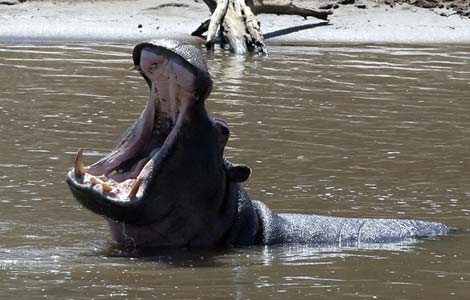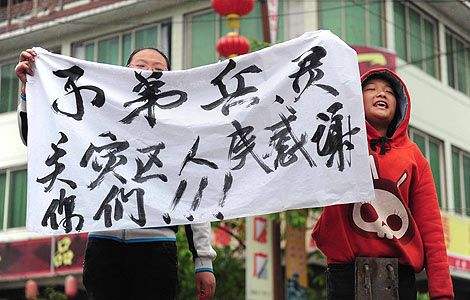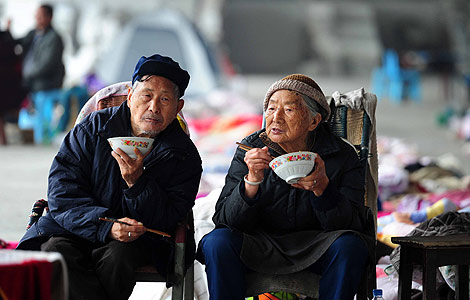Fears surface after hippo kills tourist from Shanghai
Updated: 2013-04-24 02:24
By LI LIANXING in Nairobi, Kenya and SHI YINGYING in Shanghai (China Daily)
|
||||||||
Lake Naivasha is one of the major habitats for hippos in Kenya.
"Hippos normally remain underneath the water in daytime and come to the bank for food at night," said Liu Shihong, a Chinese guide working at a Kenyan travel agency.
"Despite hippos' tame look, they are actually one of the most aggressive animals in Africa, claiming the most human lives every year."
Liu said he usually warns his guests not to approach the banks of Lake Naivasha after dinnertime.
Shi Qiong, a Shanghai native who visited Kenya and Tanzania in September, said many Chinese are attracted by African safaris, but many of them are not prepared for such adventures as "they are used to traveling with tourist groups that do the homework for them".
"They don't have enough self-protection awareness — hippos in a wild environment are different from those they see in the zoo — they're more aggressive," said Shi.
She added that her African tour guide advised her to stand at least 20 to 50 meters away from hippos while observing them.
Meanwhile, Han said her hotel in Kenya failed to give proper warnings to Chinese tourists.
"With the increasing number of Chinese tourists, many warning signs are still in English, French or other languages, not Chinese," he said.
Jiang Yiyi, a researcher with the China Tourism Academy's International Tourism Development Institute, said nowadays tourist safety concerns not only come from animal attacks but also from road safety issues, political turmoil and robbery. She advised tourists to buy insurance before heading abroad.
"Carry travelers' checks or use credit cards instead of cash if possible," Jiang said. She also called for Chinese tourists to regularly check official websites of the National Tourism Administration and Ministry of Foreign Affairs before visiting a foreign country to avoid dangerous areas.
Han added: "In the past, there were cases of traffic accidents or violation of regulations in the wild in Kenya that claimed the lives of Chinese tourists. Almost all the accidents were associated with illegal travel agencies or unprofessional tour guides."
Han said many Chinese tourist agencies organized their teams in China and then transferred them to less-qualified local companies to run tours. He said legally registered and professional tour agencies in Kenya will provide training on security protection for tourists.

 Children gathered together as healing process begins
Children gathered together as healing process begins
 Fears surface after hippo kills tourist from Shanghai
Fears surface after hippo kills tourist from Shanghai
 Rescuers win people’s hearts
Rescuers win people’s hearts
 House damaged, life continues in Sichuan
House damaged, life continues in Sichuan
 Relief reaches isolated village
Relief reaches isolated village
 Rainfall poses new threats to quake-hit region
Rainfall poses new threats to quake-hit region
 Funerals begin for Boston bombing victims
Funerals begin for Boston bombing victims
 Quake takeaway from China's Air Force
Quake takeaway from China's Air Force
Most Viewed
Editor's Picks

|

|

|

|

|

|
Today's Top News
Industry faces recovery fight
China's 2nd aircraft carrier will be 'larger'
China thanks countries
for quake relief aid
China, US to enhance mutual trust
Beijing protests Diaoyu incident
Copyrights take a bite out of Apple
Four new H7N9 cases
Landslide kills 9 in SW China
US Weekly

|

|







